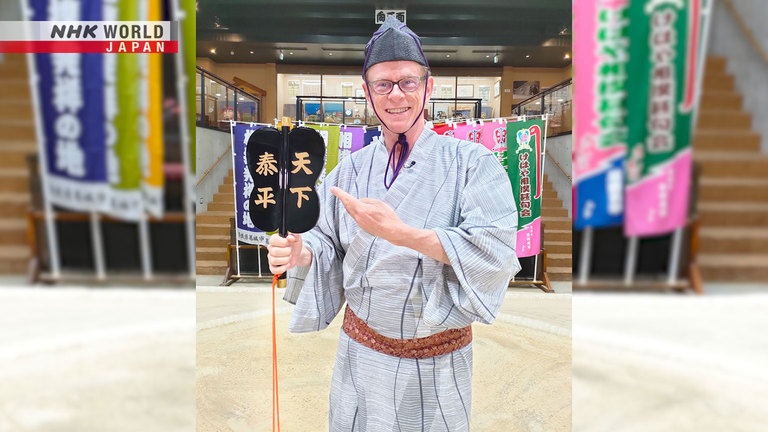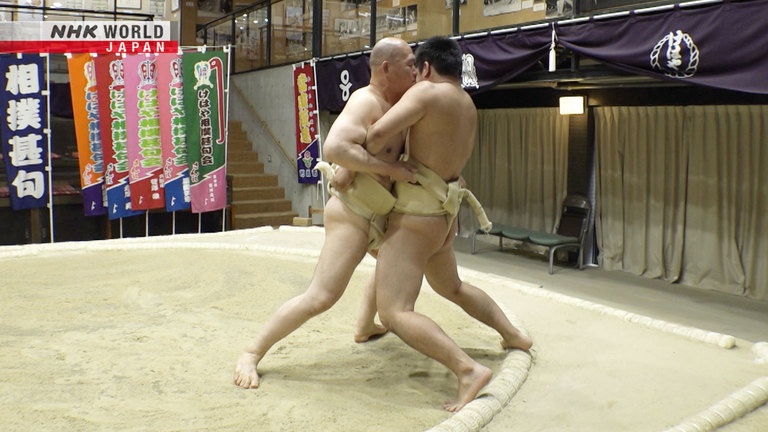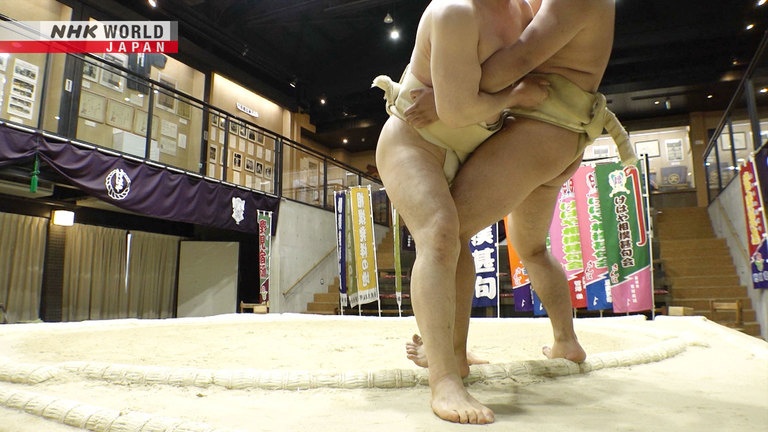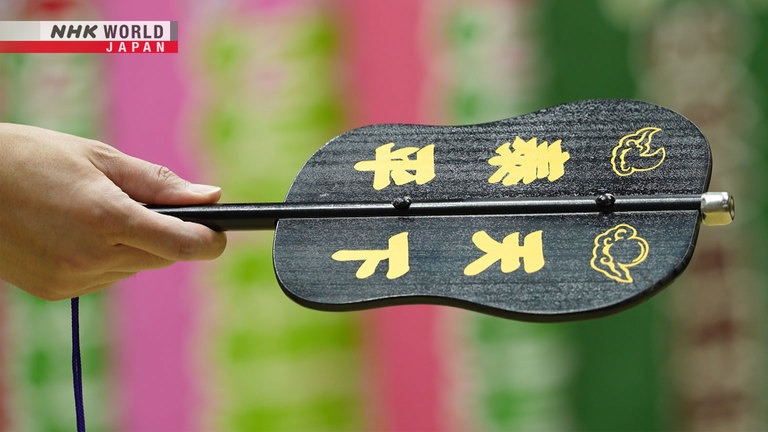Sumo
The Japanese language is rich in words and expressions influenced by nature, history and culture. This episode introduces words related to sumo. Throughout its long history, sumo has been performed as a ritual to pray for a good harvest and safety, and was practiced by samurai warriors as part of their training. Children also enjoyed it as a game. Sumo is close to the hearts of Japanese people, and it has inspired many expressions that are used in daily life. Poet, literary translator, and long-time Japan resident Peter MacMillan guides us through these words and the culture behind them.

Peter MacMillan guides us through unique words related to sumo

"Dohyogiwa": a decisive moment

"Isamiashi": going overboard

"Gunbai ga agaru": to win
Transcript
"Yukigesho."
"Karakurenai."
The Japanese language is rich in unique expressions that reflect nature and culture.
Magical Japanese.
Today's theme is... sumo.
Throughout its long history, this sport has been performed as a ritual
to pray for a good harvest and safety,
and was practiced by samurai warriors as part of their training.
Children also enjoyed it as a game.
Sumo is close to the hearts of Japanese people,
and it has inspired many words and expressions.
"Hakke yoi nokotta!"
Hello, I'm Peter MacMillan.
Sumo has been hugely popular since the Edo Period.
It's considered Japan's national sport.
Sumo has fans all over the world!
I think it's because it looks so... Japanese.
And it's easy to understand who wins or loses.
Wrestlers battle in a ring called a "dohyo."
If anything but their feet touches the ground, they lose.
And the same if they are forced out of the ring.
Watch out for the edge of the circle!
"dohyogiwa."
"Giwa" means "edge."
"Dohyogiwa" refers to the edge of the sumo ring.
It's this edge that determines who wins or loses a sumo match.
From this, "dohyogiwa" also came to mean a decisive moment.
My parents told me if I don't do well on the next exam, they'll take away my tablet.
So you're at the "dohyogiwa"
- decisive moment.
"dohyogiwa."
"dohyogiwa."
"isamiashi."
"Isami" means courage, and "ashi" means foot.
"Isamiashi" is used when a wrestler tries to push his opponent to the edge,
but loses control and accidentally steps out of the dohyo.
The word has also come to mean someone who goes overboard and ends up in a tight spot,
or fails to achieve their original goal.
The president announced the next project in front of the reporters.
But we haven't even found someone to lead it yet.
I know he wants to make a good impression,
but it's "isamiashi" - going overboard.
"isamiashi."
"isamiashi."
The referee, or "gyoji," decides who wins or loses.
They use this to announce their decision.
"gunbai ga agaru."
A "gunbai" is a large fan that commanders of old used to carry on the battlefield.
"Agaru" means to rise.
The phrase is used in daily conversation when someone comes out ahead in a situation.
So she chose Bob instead of Tom.
I didn't think there was a chance
that "gunbai ga agaru" -victory would come- to Bob.
"gunbai ga agaru."
"gunbai ga agaru."
"shikirinaoshi."
"Shikiri" means to control the pace or process of something, and "naoshi" means to reset.
A sumo bout begins when the two wrestlers touch the dohyo with both fists and then rise in unison.
If their timing is off, they start over again.
This is called "shikirinaoshi."
It's also used in daily conversation when starting something over, or when restarting work on a plan.
"shikirinaoshi."
"shikirinaoshi."
"hitorizumo."
"Hitori" is "one person."
Sumo changes to "zumo" when preceded by another word.
The expression originally meant making sumo moves against an invisible opponent.
Now, it refers to an effort that failed to win support.
No one wants to go on that camping trip you keep bringing up.
Yeah, I guess I'm doing "hitorizumo"
- pushing for it all on my own.
"hitorizumo."
"hitorizumo."
Guess where this "hitorizumo," or "solo sumo," occurs?
At a shrine!
He is fighting... the deity of a shrine!
And in some regions, the wrestler might lose on purpose to please the deity.
Here are some other movements that originate from sumo's history as a Shinto ritual.
"shiko o fumu."
This is the first move wrestlers make after their names are called and they enter the dohyo.
In this ceremonial move, a wrestler stands with his legs apart,
and then raises each foot high in the air before stomping the ground.
"Shiko" is associated with "ugliness."
It means something formidable, impure, or unpleasant.
Sumo wrestlers pray for peace by "fumu," or stomping down on the things that bring bad fortune.
Looking at sumo on TV, one feels like it is a sport of strength,
but being close to the ring, one feels the deep, spiritual aspect of Sumo,
the sense of ceremony, the deep bowing, the casting of wads of salt for purification, and so on.
”katasukashi.”
”Kata" is "shoulder," and "sukashi" means to deftly avoid an attack.
In sumo, ”katasukashi" is a move in which a wrestler dodges an opponent,
clamps their shoulder, and pulls them down.
The word has also come to be used figuratively
when high expectations or enthusiasm about something are dashed.
My dad called to say he'd won a lottery prize, so I rushed home - only to find he'd won one dollar.
That's a "katasukashi"
- disappointment.
”katasukashi.”
”katasukashi.”
"kinboshi."
"Kin" means "gold," and "boshi" refers to a mark such as a star or a dot.
In sumo, a win is indicated with a white dot, while a loss is shown with a black dot.
"Kinboshi," or a gold dot, refers to when a low-ranking wrestler beats a "yokozuna,"
or wrestler of the highest rank.
From this, it has come to mean a major achievement.
I passed the audition!
I couldn't have done it without your advice.
No, your hard work paid off.
And you'll be the lead dancer too!
It's a "kinboshi"!
- major achievement.
"kinboshi."
"kinboshi."
I too would like to earn a gold star as a translator.
That's why I will continue to study Japanese!
However, "hitorizumo,” or solo sumo seems a bit lonely...
Let's all practice together!
See you next time.
Bye.